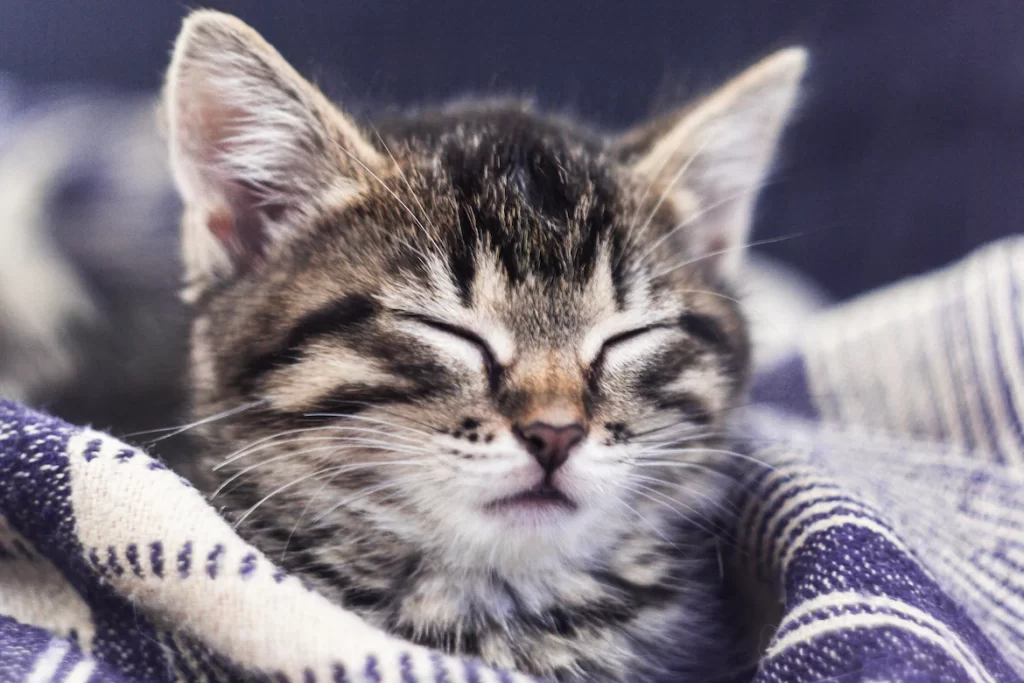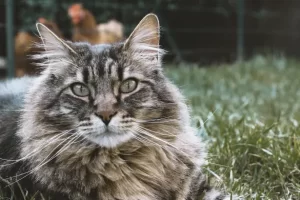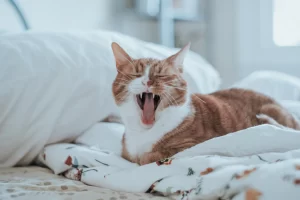Last updated on February 6th, 2023 at 01:46 am

[toc]
If you are wondering what cause my cat to sneeze, you have come to the right place. We have all the answer you are looking for. Cats are beloved pets that bring joy and comfort to millions of households worldwide. With their playful personalities and affectionate nature, it’s no wonder that they are one of the most popular pets. But despite their cute and cuddly appearance, cats are also susceptible to various health issues that can cause concern for their owners. One such case is sneezing, which may seem harmless but can sometimes signify a more significant health problem.
Sneezing in cats can be caused by various factors, ranging from foreign objects or irritants in their nose to upper respiratory infections, allergies, dental problems, and even more severe health issues. Understanding the various causes of cat sneezing is essential to provide proper care and treatment for your furry companion. In this article, I’ll take you through reasons to cause your cat to sneeze and how to help your cat if they exhibit this symptom.
Also read: Top 15 Common Cat Health Problems
Why does my cat sneeze? Here are the reasons to this health issue
Allergies and irritants
Irritants and allergies can cause your cat to sneeze by irritating the nasal passages and triggering the sneezing reflex. When the nasal passages are irritated, the body tries to remove the irritant by expelling air through the nose, resulting in sneezing.
Irritants include dust, smoke, perfumes, household cleaners, and other substances irritating the nasal passages. Allergies can also cause sneezing in cats by triggering an immune response in the nasal passages. Common allergens in cats include dust mites, mold, pollen, and certain foods.
When a cat is exposed to an irritant or allergen, it can cause inflammation and irritation in the nasal passages. This can lead to sneezing and other symptoms such as nasal discharge, itching, and rubbing of the face. In some cases, cats with allergies may also experience coughing, wheezing, and difficulty breathing.
It’s essential to seek veterinary care if you suspect your cat’s sneezing is related to an irritant or allergy. A veterinarian can diagnose the underlying cause and develop a treatment plan, including medication, changes to the cat’s environment, or other interventions. By addressing the underlying cause, you can help your cat to feel more comfortable and reduce the frequency of their sneezing.
Dental illness
Dental illness can be the reason to cause your cat to sneeze. Dental infection can occur when bacteria, plaque, or tartar build up on the teeth and gums, leading to gum disease or tooth decay.
When dental illness is present, it can cause inflammation and infection in the mouth, which can spread to the nasal passages and sinuses. This can irritate and trigger the sneezing reflex, leading to frequent sneezing. In some cases, dental illness can also cause a discharge from the nose, which a foul odor may accompany.
It’s essential to seek veterinary care if you suspect your cat’s sneezing is related to dental illness. A veterinarian can diagnose the underlying cause and develop a treatment plan, which may include cleaning and scaling of the teeth, extractions, and other dental procedures. By treating dental illness, you can help your cat to feel more comfortable and reduce the frequency of their sneezing. You can also help prevent the spread of infection and other complications associated with dental illness.
Feline immunodeficiency virus (FIV)
Feline immunodeficiency virus (FIV) is a viral infection that can cause various cat symptoms and could contribute to why your cat sneezes. FIV weakens the immune system and makes cats more susceptible to secondary infections, which can cause irritation and inflammation in the nasal passages. When the nasal passages are irritated, the body tries to remove the irritant by expelling air through the nose, resulting in sneezing. In addition to sneezing, cats with FIV may experience other symptoms, such as nasal discharge, difficulty breathing, and loss of appetite.
FIV is primarily spread from cat to cat through bite wounds, and it can take several weeks or months for symptoms to appear after a cat is infected. It’s essential to seek veterinary care if you suspect your cat may have FIV, as early diagnosis and treatment can help slow the progression of the disease and reduce the frequency of symptoms.
A veterinarian can diagnose FIV through a blood test, and they may also perform additional tests to evaluate the cat’s overall health and check for secondary infections. Treatment for FIV may include medications, changes to the cat’s diet and environment, and other supportive care measures. By seeking veterinary care and taking steps to manage FIV, you can help your cat to feel more comfortable and reduce the frequency of their sneezing.
Underlying health issue
Underlying health issues are also another reason to cause your cat to sneeze. Some of the most common health issues that can cause sneezing in cats include respiratory infections, rhinitis, sinusitis, and tumors. Respiratory infections, such as feline herpesvirus or feline calicivirus, can cause inflammation and irritation in the nasal passages, leading to sneezing. Rhinitis is an inflammation of the nasal passages, which allergens, irritants, or infections can cause. Sinusitis is an inflammation of the sinuses, which can cause headaches, pain, pressure in the face, and sneezing.
Tumors in the nasal passages or sinuses can also cause sneezing and other symptoms such as nasal discharge, bleeding, and facial swelling. In some cases, tumors may be malignant, spreading to other body parts and causing severe health issues.
It’s essential to seek veterinary care if your cat is frequently sneezing or experiencing other symptoms, as underlying health issues can be severe and require prompt treatment. A veterinarian can diagnose the underlying cause and develop a treatment plan, including medication, surgery, or other interventions. By addressing the underlying cause, you can help your cat to feel more comfortable and reduce the frequency of their sneezing.
Upper respiratory infections
Upper respiratory infections in cats are a common cause of sneezing. According to Malcolm Weir, DVM, these infections are typically caused by viruses, such as feline herpesvirus or feline calicivirus, and can cause inflammation and irritation in the nasal passages. In addition to sneezing, cats with upper respiratory infections may experience other symptoms such as nasal discharge, coughing, and fever. The symptoms of upper respiratory infections can range from mild to severe. They may be accompanied by other signs of illness, such as lethargy, loss of appetite, and decreased activity levels.
To diagnose upper respiratory infections in cats, a veterinarian will typically perform a physical examination and may also run tests such as blood work or a nasal swab. Treatment for upper respiratory infections typically involves antibiotics and supportive care measures, such as ensuring that the cat has plenty of rest and fluids. In some cases, more aggressive treatment may be necessary, such as hospitalization or oxygen therapy.
It’s important to note that upper respiratory infections can be highly contagious, mainly when cats are housed in close quarters, such as in shelters or catteries. Therefore, it’s essential to prevent the spread of upper respiratory infections, such as isolating infected cats and thoroughly cleaning and disinfecting the environment.
Regular sneezing
When a cat sneezes regularly, there is nothing to worry about. Sneezing helps clear the nasal passages of irritants and is a typical reflex in cats. However, if a cat frequently sneezes or other symptoms accompany it, it may indicate an underlying health issue.
In some cases, regular sneezing in cats may be caused by environmental irritants, such as dust, smoke, or strong scents. To help prevent sneezing due to environmental irritants, keeping the living area clean and well-ventilated and limiting exposure to strong odors and chemicals is essential.
In other cases, regular sneezing may be caused by infections, such as feline herpes virus or calicivirus. These infections can cause inflammation and irritation in the nasal passages and may be accompanied by other symptoms such as nasal discharge, coughing, and fever.
Regular sneezing may indicate allergies, particularly if the cat is exposed to environmental allergens such as dust, pollen, or mold. Other symptoms of allergies in cats may include itchy skin, runny eyes, and coughing.
If your cat is regularly sneezing and you’re concerned, it’s essential to seek veterinary care to determine the underlying cause and develop an appropriate treatment plan. Regular sneezing that is not accompanied by other symptoms is generally considered to be expected. Still, it’s always best to seek veterinary care to ensure your cat is healthy and comfortable.
Conclusion
There are many reasons why a cat sneezes, ranging from environmental irritants to underlying health issues. While occasional sneezing is considered normal in cats, frequent sneezing or sneezing accompanied by other symptoms may indicate an underlying problem that requires veterinary attention. If your cat regularly sneezes, it’s essential to seek veterinary care to determine the underlying cause and develop an appropriate treatment plan.
With prompt and proper veterinary care, most cases of sneezing in cats can be successfully managed and treated. By keeping a close eye on your cat’s sneezing behavior and seeking veterinary care, you can help ensure that your cat stays healthy and comfortable.


